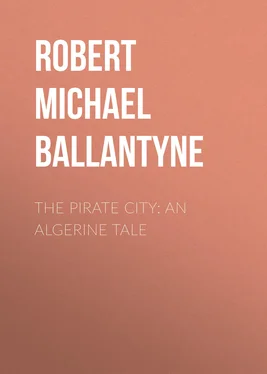Robert Michael Ballantyne - The Pirate City - An Algerine Tale
Здесь есть возможность читать онлайн «Robert Michael Ballantyne - The Pirate City - An Algerine Tale» — ознакомительный отрывок электронной книги совершенно бесплатно, а после прочтения отрывка купить полную версию. В некоторых случаях можно слушать аудио, скачать через торрент в формате fb2 и присутствует краткое содержание. Жанр: Детские приключения, literature_19, foreign_antique, foreign_prose, foreign_children, на английском языке. Описание произведения, (предисловие) а так же отзывы посетителей доступны на портале библиотеки ЛибКат.
- Название:The Pirate City: An Algerine Tale
- Автор:
- Жанр:
- Год:неизвестен
- ISBN:нет данных
- Рейтинг книги:5 / 5. Голосов: 1
-
Избранное:Добавить в избранное
- Отзывы:
-
Ваша оценка:
- 100
- 1
- 2
- 3
- 4
- 5
The Pirate City: An Algerine Tale: краткое содержание, описание и аннотация
Предлагаем к чтению аннотацию, описание, краткое содержание или предисловие (зависит от того, что написал сам автор книги «The Pirate City: An Algerine Tale»). Если вы не нашли необходимую информацию о книге — напишите в комментариях, мы постараемся отыскать её.
The Pirate City: An Algerine Tale — читать онлайн ознакомительный отрывок
Ниже представлен текст книги, разбитый по страницам. Система сохранения места последней прочитанной страницы, позволяет с удобством читать онлайн бесплатно книгу «The Pirate City: An Algerine Tale», без необходимости каждый раз заново искать на чём Вы остановились. Поставьте закладку, и сможете в любой момент перейти на страницу, на которой закончили чтение.
Интервал:
Закладка:
R. M. Ballantyne
The Pirate City: An Algerine Tale
Chapter One.
Opens the Tale
Some time within the first quarter of the present nineteenth century, a little old lady—some people would even have called her a dear little old lady—sat one afternoon in a high-backed chair beside a cottage window, from which might be had a magnificent view of Sicilian rocks, with the Mediterranean beyond.
This little old lady was so pleasant in all respects that an adequate description of her is an impossibility. Her mouth was a perfect study. It was not troubled with anything in the shape of teeth. It lay between a delicate little down-turned nose and a soft little up-turned chin, which two seemed as if anxious to meet in order to protect it. The wrinkles that surrounded that mouth were innumerable, and each wrinkle was a distinct and separate smile; so that, whether pursing or expanding, it was at all times rippling with an expression of tender benignity.
This little old lady plays no part in our tale; nevertheless she merits passing introduction as being the grandmother of our hero, a Sicilian youth of nineteen, who, at the time we write of, sat on a stool at her feet engaged in earnest conversation.
“Grandmother,” said the youth in a perplexed mood, “why won’t you let me go into the Church instead of brother Lucien? I’m certain that he does not want to, though he is fit enough, as far as education goes, and goodness; but you know well enough that he is desperately fond of Juliet, and she is equally desperate about him, and nothing could be more pleasant than that they should get married.”
“Tut, child, you talk nonsense,” said the old lady, letting a sigh escape from the rippling mouth. “Your father’s dearest wish has always been to see Lucien enter the Church, and although Juliet is our adopted child, we do not intend to interfere with the wishes of her uncle the abbot, who has offered to place her in the convent of Saint Shutemup. As to you taking Lucien’s place,”—here the mouth expanded considerably—“ah! Mariano, you are too foolish, too giddy; better fitted to be a sailor or soldier I should think—”
“How!” interrupted Mariano. “Do you then estimate the profession of the soldier and sailor so low, that you think only foolish and giddy fellows are fit for it?”
“Not so, child; but it is a school which is eminently fitted to teach respect and obedience to foolish and giddy fellows who are pert to their grandmothers.”
“Ah! how unfair,” exclaimed Mariano, with assumed solemnity; “I give you good advice, with gravity equal to that of any priest, and yet you call me pert. Grandmother, you are ungrateful as well as unjust. Have I not been good to you all my life?”
“You have, my child,” said the little old lady; “very good—also rather troublesome, especially in the way of talking nonsense, and I’m sorry to find that although your goodness continues, your troublesomeness does not cease!”
“Well, well,” replied the youth, with a sprightly toss of the head, “Lucien and I shall enjoy at least a few weeks more of our old life on the blue sea before he takes to musty books and I to the stool of the clerk. Ah, why did you allow father to give us a good education? How much more enjoyable it would have been to have lived the free life of a fisherman—or of that pig,” he said, pointing to one which had just strayed into the garden and lain down to roll in the earth—“what happy ignorance or ignorant happiness; what concentrated enjoyment of the present, what perfect oblivion as to the past, what obvious disregard of the future—”
“Ay,” interrupted the little old lady, “what blissful ignorance of the deeds of ancient heroes, of the noble achievements of great and good men, of the adventures of Marco Polo, and Magellan, and Vasco de Gama, over whose voyages you have so often and so fondly pored.”
“I see, grandmother, that it is useless to argue with you. Let us turn to a graver subject. Tell me, what am I to bring you from Malta? As this is in very truth to be our last voyage, I must bring you something grand, something costly.—Ah, here comes Juliet to help us to decide.”
As he spoke a pretty dark-eyed girl of nineteen entered the room and joined their council, but before they had gone very deep into the question which Mariano had propounded, they were interrupted by the entrance of the head of the house, Francisco Rimini, a strong portly man of about fifty years of age, with a brown, healthy complexion, grizzled locks, a bald pate, and a semi-nautical gait. He was followed by a stranger, and by his eldest son, Lucien—a tall, grave, slender youth of twenty-three, who was in many respects the opposite of his brother Mariano, physically as well as mentally. The latter was middle-sized, broad-shouldered, and very powerful, with short curly brown hair, flashing eyes and sprightly disposition—active as a kitten, and rather mischievous. Lucien was grave, gentle, and studious; elegantly rather than powerfully formed, and disposed rather to enjoy fun by looking on than engaging in it. Both brothers, as well as their father, possessed kindly dispositions and resolute spirits.
“Mother,” said Francisco, “let me introduce to you my friend Signor Bacri, a merchant who goes in my vessel as a passenger to Malta. He dines with us to-day; and that reminds me that you must hasten our dinner, as events have transpired which oblige me to set sail two hours earlier than I had intended; so please expedite matters, Juliet.”
The stranger bowed with Oriental dignity to the little old lady, and, seating himself by her side, entered into conversation.
Bacri was a middle-aged man of magnificent appearance. From the cast of his features it was easy to perceive that he was of Jewish extraction, and his proportions might have been compared to those of the ancient enemy of his nation, Goliath. Like Saul, he was a head and shoulders higher than ordinary men, yet he evidently placed no confidence in his physical strength, for although his countenance was grave and his expression dignified, he stooped a good deal, as though to avoid knocking his head against ceilings and beams, and was singularly humble and unobtrusive in his manners. There was a winning softness, too, in his voice and in his smile, which went far to disarm that distrust of and antipathy to his race which prevailed in days of old, and unfortunately prevails still, to some extent, in Christendom.
With the activity of a good housewife, Juliet expedited the operations of the cook; dinner was served in good time; Francisco, who was owner of his vessel and cargo as well as padrone or captain, entertained Bacri with accounts of his adventures on the sea, which the Jew returned in kind with his experiences of mercantile transactions in savage lands. Mariano drank in all that they said with youthful avidity, and the little old lady’s mouth rippled responsive, like the aspen leaf to the breeze; while Lucien and Juliet, thus left to themselves, had no other resource than to entertain each other as best they could!
Then the adieux were said, the voyagers went down to the port, embarked on board their good ship—a trim-built schooner—and set sail with a fair wind.
“I wish I saw them all safe back again!” said the little old lady, with a sigh.
Juliet said nothing, though she echoed the sigh.
Meanwhile the schooner leant over to the breeze, and ere night-fall left the shores of Sicily far behind.
Chapter Two.
Unfolds a Little of the Tale
Another and a very different vessel chanced to be floating in those seas at the time the Sicilian trader set sail. At a distance she might have been mistaken for a fishing-boat, for she carried only two lateen sails, of that high triangular form which may still be seen in the Mediterranean and on the lakes of Switzerland. In reality, however, the vessel was of greater dimensions than even the largest boat, and her main-mast with its sail was of gigantic proportions. She was also full-decked, and several pieces of heavy ordnance pointed their black muzzles from port-holes in her bulwarks.
Читать дальшеИнтервал:
Закладка:
Похожие книги на «The Pirate City: An Algerine Tale»
Представляем Вашему вниманию похожие книги на «The Pirate City: An Algerine Tale» списком для выбора. Мы отобрали схожую по названию и смыслу литературу в надежде предоставить читателям больше вариантов отыскать новые, интересные, ещё непрочитанные произведения.
Обсуждение, отзывы о книге «The Pirate City: An Algerine Tale» и просто собственные мнения читателей. Оставьте ваши комментарии, напишите, что Вы думаете о произведении, его смысле или главных героях. Укажите что конкретно понравилось, а что нет, и почему Вы так считаете.












